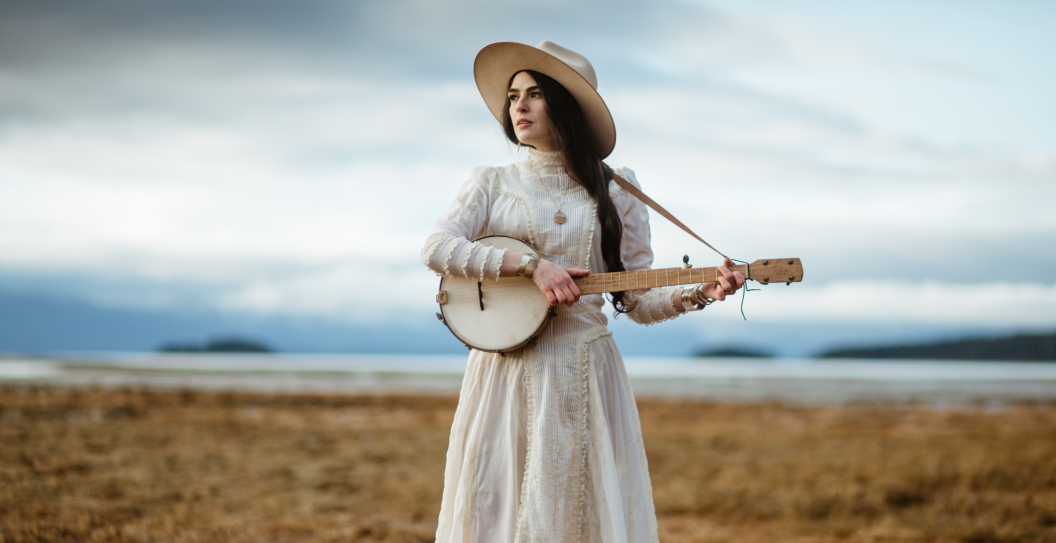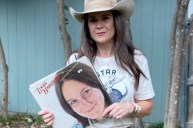Upstairs at Skagway, Alaska's Red Onion Saloon, nails in the ceiling denote long-gone room dividers and peeling layers of wallpaper reveal how the brothel's workers personalized their quarters. Their histories, and those of the women who journeyed further north to Dawson City to carve out harsh and richly-storied lives during the Klondike Gold Rush, captured Alaskan folk singer Annie Bartholomew's imagination.
Her first full-length album, Sisters of White Chapel, named after the local moniker for the red light district, evokes largely untold stories of the ladies who thrived on the fringes of society in Dawson City's brief flash at the center of the gold rush (1897-1899). As is inherent to the explosive growth of any boomtown, a chaotic, gritty, entrepreneurial, anything goes atmosphere prevails in Bartholomew's Dawson City.
Welcome to the demimonde.
Deriving from French, the demimonde ("half world") is a murky underworld inhabited by many disreputable characters, but Bartholomew focuses on its women, mostly sex workers, whose stories history usually excludes. Ushering the listener into the shadows ("Welcome to the demimonde / Bienvenue à la demimonde") Bartholomew sets up both the stakes — "if you see me on the by and by / don't you call me by my name / lest I'll die" — and the alternative — "ain't no man gonna buy off me / for life is a wife to misery."
Miners came to Dawson City seeking prosperity, often in vain. Women entered the demimonde to claim autonomy over their lives and bodies.
"For these gals, making the choice to go to sex work, instead of committing suicide, instead of just marrying the first guy who offers to take your hand in marriage, they were kind of reinventing themselves. And so the religious imagery is there on purpose," Bartholomew says.

Julie Shelton
Indeed, the narrator of "White Chapel Woman" imagines herself reborn: "I was bathed, I was baptized / silk and lace be my disguise." Her story comes from a newspaper clipping Bartholomew found about a woman who turned to sex work after losing her belongings on the Thirty Mile River, one of the few and dangerous routes to the Yukon.
At the turn of the century, the northern territories were only accessible by limited, treacherous approaches. These included Thirty Mile River, and a high mountain pass so harsh it was nicknamed Dead Horse Trail (which also inspired a homonymous track on the album). Driven to attempt the journey by the intoxicating allure of a better life in Dawson City, many people died or lost possessions and animals along the way.
"It was the real stories that haunted me and I couldn't stop thinking about," says Bartholomew, who started thinking about the concept album after touring the brothel museum at the Red Onion Saloon. As she dug into the women's stories through historical research, the women's tenacity, ingenuity, and bravery spoke to her, cohering into an album's worth of songs and a play of the same name (which premiered last year).
Extending well beyond stereotypes, Sisters of White Chapel's nine tracks showcase the nuances of the demimonde often glossed over in frontier narratives. Setting out for the Klondike in a driving whirl of fiddle, banjo and upright bass, one woman loses her husband on the way, "All for the Klondike's Gold"; slogging along the "Dead Horse Trail" to the beat of an unrelenting bass, another implores with single-minded focus "take me to Dawson, don't care what it takes;" and in Dawson, empowered brothel workers assure each other "sister you know we gonna win," carpet girls shoulder rugs to throw down for back alley and boardwalk trysts, and "Run Around Lucy" fronts a cigar shop to disguise her business.
Much as gold rush towns were melting pots of hopeful and enterprising souls, Sisters of the White Chapel brings together a saloon string band of mandolin, banjo, fiddle, piano, guitar and occasional percussion to conjure Dawson City's underbelly. Committed to her craft, Bartholomew learned claw hammer banjo for the project and layers in the era's vernacular, words like "demimonde," "white chapel" and "moil" to round out the imagery.
As Dawson city's shining moment fades into the past, Bartholomew puts it to bed with a sultry lullaby, "Spoils." Later, reflecting on her time in Dawson City on the way to her next adventure, she quips, "they tried to sell me back my virtue / I wouldn't waste a dollar thinkin' about the price." She ends the album on the melancholy, "Last Confession," about the lengths women went to in order to conceal their time in Dawson City when they returned to civilized life.
"I didn't try to tell every story... just the threads that inspired me, the ones that elicited a reaction in me, the ones that haunted me that I had to sit with," Bartholomew says.
Bartholomew's characters weren't the only ones to transform in the demimonde. For years, she was reluctant to claim her Alaskan roots in her work (she inscribed her banjo strap with "cheechako," the name given by miners to newbies). But writing Sisters of White Chapel, Bartholomew found the confidence to showcase her home state, through stories she dearly wanted to share with the world.
"No one would give Townes Van Zandt a hard time for writing about Texas or Dolly for writing about Tennessee or Loretta Lynn or Rhiannon Giddens. Where these people are from, the sense of place in their writing, is also a character," she realized.
And for Bartholomew, that character is not only integral to the stories, but a foil through which to examine how women are treated and viewed. She hopes the album will challenge preconceptions about sex work and work and livelihood in general in the 21st century.
"Because it really could have happened to anyone," she says. "How many of us are living paycheck to paycheck? If we didn't have access to our own bank account, or credit cards or family to lean on, or even a living wage, what would we do?"
READ MORE: Brennen Leigh is Obsessed with the Golden Era of Nashville. She Wants You to be Too.




